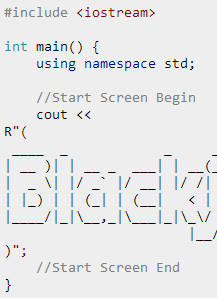C++Now 2014: Student/Volunteer Program Accepting Applications

Student/Volunteer Program Now Accepting Applications
May 12 – 17, 2014
Aspen CO, USA
October 25, Pavia, Italy
November 6-8, Berlin, Germany
November 3-8, Kona, HI, USA
By Hartmut Kaiser | Jan 28, 2014 07:56 AM | Tags: c++11

Student/Volunteer Program Now Accepting Applications
May 12 – 17, 2014
Aspen CO, USA
By Blog Staff | Jan 27, 2014 03:06 PM | Tags: None

The original question on SO, but note the best answer is pepper_chico's rather than the selected answer:
Only Detect Text in Quotations (C++)
I'm not great at programming and recently started to read tutorials on C++.
I decided I would attempt to make a simple blackjack program. I tried to make a title with "big text" but C++ is preventing me from doing it because it is detecting other things inside the text.
//Start Screen Begin cout << " ____ _ _ _ _ "; cout << "| __ )| | __ _ ___| | __(_) __ _ ___| | __ "; cout << "| _ \| |/ _` |/ __| |/ /| |/ _` |/ __| |/ / "; cout << "| |_) | | (_| | (__| < | | (_| | (__| < "; cout << "|____/|_|\__,_|\___|_|\_\/ |\__,_|\___|_|\_\ "; cout << " |__/ "; //Start Screen EndThis is what I am trying to display, yet keep getting the following error:
undefined reference to'WinMain@16'I am asking if there is a way to tell C++ I only want it to read and display the text, and not use any functions.
By Blog Staff | Jan 24, 2014 01:01 PM | Tags: None
 From new C++ user groups springing up across Europe and upcoming conferences, to the Boost refactoring and (of course) C++14, Jens Weller has a nice piece previewing some of the things to look forward to for C++ in 2014.
From new C++ user groups springing up across Europe and upcoming conferences, to the Boost refactoring and (of course) C++14, Jens Weller has a nice piece previewing some of the things to look forward to for C++ in 2014.
C++ in 2014
by Jens Weller
Note that Jens' list is not complete, but it gives a pretty good overview of what's coming up in the near term with a few more things to be added later.
A small teaser from the article:
I already know that there are new C++ User Groups in Aachen, Dortmund, Heidelberg and Munich in Germany, also a Russian C++ User Group is now meeting in St. Petersburg and Moscow. I think a few others will follow...
By Blog Staff | Jan 24, 2014 09:32 AM | Tags: intermediate
Quick A: Maybe, but it generally commits you to exposing the internal type (can't change representation).
Recently on SO:
Should I use noexcept for getters always?
Should I use
noexceptmethod modifier for getters always in C++11?I mean simple getters here that just return members. At least in all my getters I have here an exception can't possibly be thrown. One downside is that a getter gets too verbose:
const std::string& getName() const noexcept{ return name; }The good side as pointed out in Stroustrup's book is that the compiler might do some optimizations here and there.
By Blog Staff | Jan 24, 2014 09:09 AM | Tags: intermediate

Two Full Days of C++11 for C++ Programmers
Instructors: Michael Caisse and Jon Kalb
March 25-26
San Francisco, CA, USA
From the announcement:
C++11 introduces a lot of new tools for writing code that is expressive, but continues the C++ tradition of uncompromised performance. If you are comfortable with C++, but need to get up to speed with the language and library extensions offered by C++11 this is your opportunity to learn the latest in C++ from some of the best instructors available.
Topics covered include:
- Move semantics, rvalues, and perfect forwarding
- Lambda expessions
- New smart pointers
- Tuples
- Range-based
forloops- Variadic templates
- Standard
functionandbindautoanddecltype- Initializer lists
- Uniform initialiation
constexpr- Delegating constructors
- Defaulted and deleted member functions
explicitandfinalnullptrPrerequisites:
No knowledge of C++11 is assumed, but basic familiarity with C++ is assumed. It isn’t necessary that students be able to write templates or operator overloads unassisted, but they need to be able to follow examples of such code, or they are likely to fall behind.
By Blog Staff | Jan 19, 2014 11:33 AM | Tags: intermediate basics advanced

ACCU 2014
April 8-12, 2014
Bristol, UK
See the schedule's C++ highlights for 17+1 reasons for a C++ developer to attend this year.
By Blog Staff | Jan 15, 2014 10:26 AM | Tags: intermediate
 The solution to the latest GotW problem is now available:
The solution to the latest GotW problem is now available:
GotW #95 Solution: Thread Safety and Synchronization
by Herb Sutter
From the article:
This GotW was written to answer a set of related frequently asked questions. So here’s a mini-FAQ on "thread safety and synchronization in a nutshell," and the points we’ll cover apply to thread safety and synchronization in pretty much any mainstream language.
By Blog Staff | Jan 15, 2014 09:08 AM | Tags: None
Conference chair Jon Jagger has published the conference schedule and session abstracts for ACCU 2014.
ACCU 2014 Conference Schedule
Follow conference news via @accu2014 on Twitter.
Some highlights of this year's schedule include a number of C++ talks. Most of the following speakers are ISO C++ committee members:
Switching to C++11 and C++14 in One Day (Nico Josuttis)
C++14 -- An Overview of the New Standard for C++(11) Programmers (Peter Sommerlad)
There Ain't No Such Thing As a Universal Reference (Jonathan Wakely)
The C++14 Standard Library (Jonathan Wakely)
C++ Dynamic Performance (Aleksandar Fabijanic)
C++ Undefined Behavior -- What Is It, and Why Should I Care? (Marshall Clow)
Large-Scale C++ -- Advanced Levelization Techniques (John Lakos)
C++ Pub Quiz (Olve Maudal)
Creating Safe Multi-Threaded Applications in C++11 (Jos van Eijndhoven)
Random Number Generation in C++ -- Present and Potential Future (Pattabi Raman)
Range and Elevation -- C++ In a Modern World (Steve Love)
Generic Programming with Concepts Lite (Andrew Sutton)
Where Is C++ Headed? (Hubert Matthews)
Complementary Visions: Integrating C++ and Python with Boost.Python (Austin Bingham)
The Continuing Future of C++ Concurrency (Anthony Williams)
Polymorphic Allocators for Fundamental Libraries (Alisdair Meredith)
Executors for C++ (Detlef Vollmann)
Endnote: Everything You Ever Wanted To Know About Move Semantics (and then some) (Howard Hinnant)
By Blog Staff | Jan 14, 2014 08:49 AM | Tags: intermediate
.jpg) In the current MSDN Magazine:
In the current MSDN Magazine:
Using Regular Expressions with Modern C++
by Kenny Kerr
From the article:
C++11 introduced a long list of features that are in themselves quite exciting, but if all you see is a list of isolated features, then you’re missing out. The combination of these features makes C++ into the powerhouse that many have grown to appreciate. I’m going to illustrate this point by showing you how to use regular expressions with modern C++... the combination of C++ language and library features really turns C++ into a productive programming language.
By Blog Staff | Jan 14, 2014 06:54 AM | Tags: None
Quick A: Use a template alias. Several standard ones are coming in C++14.
Recently on SO:
How can I avoid writing
::valueand::typewhen usingstd::enable_if? [cppx]In some of my code, namely the header
rfc/cppx/text/String.h, I found the following mysterious snippet:template< class S, class enable = CPPX_IF_( Is_a_< String, S > ) > void operator! ( S const& ) { string_detail::Meaningless::operation(); }The
operator!is in support of aStringclass that has an implicit conversion to raw pointer. So I overload (among others)operator!for this class and derived classes, so that inadvertent use of a non-supported operator will give a suitable compilation error, mentioning that it's meaningless and inaccessible. Which I think is much preferable to such usage being silently accepted with an unexpected, incorrect result.The
CPPX_IF_macro supports Visual C++ 12.0 (2013) and earlier, which finds C++11 using to be mostly beyond its ken. For a more standard-conforming compiler I would have written just ...template< class S, class enable = If_< Is_a_< String, S > > > void operator! ( S const& ) { string_detail::Meaningless::operation(); }This looks like
std::enable_if,template< class S, class enabled = typename std::enable_if< Is_a_< String, S >::value, void >::type > void operator! ( S const& ) { string_detail::Meaningless::operation(); }except that the
If_orCPPX_IF_, and its expression, is much more concise and readable.How on Earth did I do that?